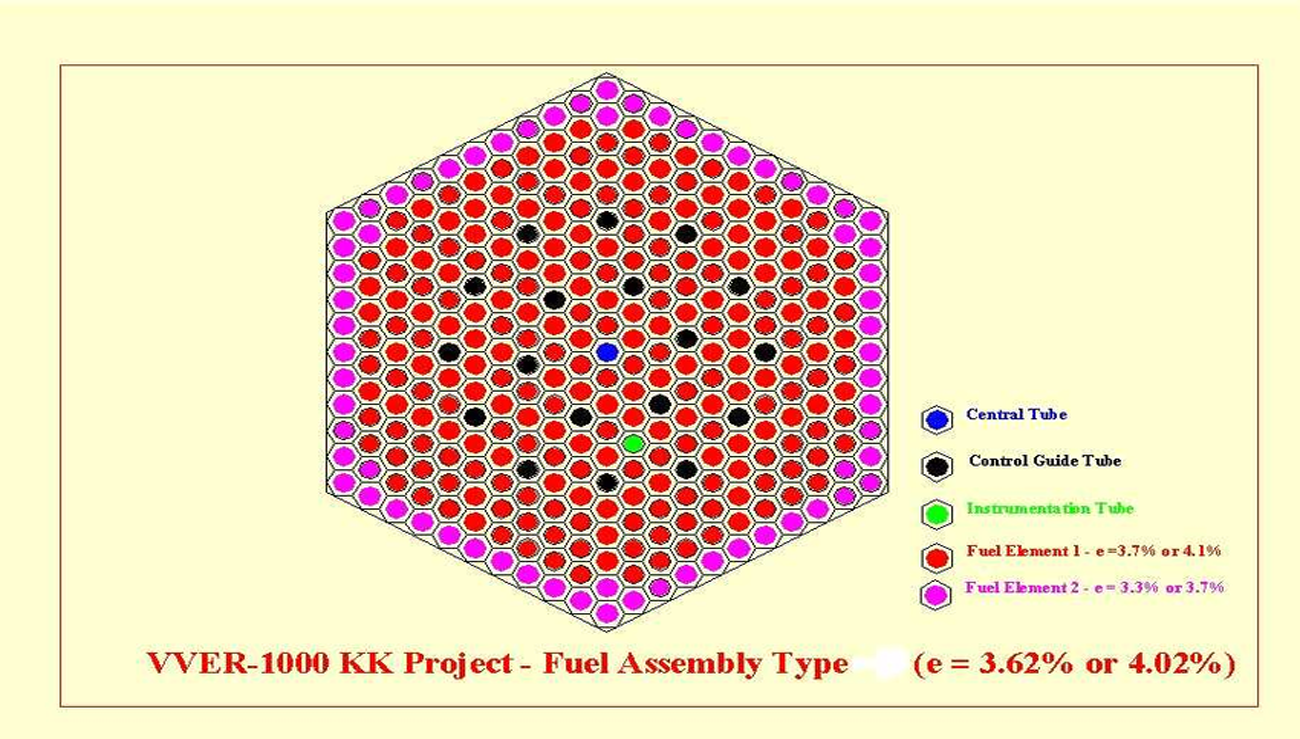
Homogenization Effects of VVER-1000 Fuel Assembly on Criticality Calculations
Due to cost effective and simplicity homogeneous reactors have been widely used for experimental and research purposes. Parameters which are difficult to get from a heterogeneous reactor system can be easily obtained from a homogeneous reactor system and can be applied in the heterogeneous reactor system if the major parametric differences are known. In this study, homogenization effects of VVER (Water Water Energetic Reactor)-1000 fuel assembly on neutronic parameters have been analyzed with the universal probabilistic code MCNP (Monte Carlo N-Particle). The infinite multiplication factor (k∞) has been calculated for the reconfigured heterogeneous and homogenous fuel assembly models with 2 w/o U-235 enriched fuel at room temperature. Effect of mixing soluble boron into the moderator/coolant (H2O) has been investigated for both models. Direct and fission detected thermal to higher energy neutron ratio also has been investigated. Relative power distributions of both models have been calculated at critical and supercritical states. Burnup calculations for both the reconfigured cores have been carried out up to 5 years of operation. Effective delayed neutron fraction (βeff) and prompt removal lifetime (ℓ) also have been evaluated. All the results show significant differences between the two systems except the average relative power.
Author(s):
Sardar Muhammad Shauddin, Reactor Physics & Engineering Division, Institute of Nuclear Science & Technology, Atomic Energy Research Establishment, Ganakbari, Savar, Dhaka-1349, Bangladesh
Keywords:
Homogenization effect, Criticality calculation, Thermal neutron, Point kinetic parameter, VVER-1000
URL:
References:
A. Hebert and P. Benoist, Nucl. Sci. Eng. 109, 360 (1991). https://doi.org/10.13182/NSE109-360
J. Mondot, Proc. Specialists’ Mtg. Homogenization Methods in Reactor Physics, Lugano, Switzerland, November 13–15, 1978, IAEA-TECDOC-231, p.389, International Atomic Energy Agency (1980).
International Atomic Energy Agency (IAEA), IAEATECDOC-847, Vienna, 1995.
S. M. Shauddin, M. S. Mahmood and M. J. H. Khan, International Journal of Nuclear Energy Science and Technology 11, 175 (2017). https://doi.org/10.1504/IJNEST.2017.085775
Bernard, J. A., “Nuclear Power Plant Dynamics and Control”, Class Notes, Massachusetts Institute of Technology, Massachusetts, 22, 921 (2012).
X-5 Monte Carlo Team, “MCNP – A General Monte Carlo N-Particle Transport Code”, Version 5, LA-UR-03-1987 (revised October 3rd, 2005).
X-5 Monte Carlo Team, “MCNP – A General Monte Carlo N-Particle Transport Code”, Version 5, LACP–0245, April 24, 2003 (revised October 3rd, 2005; February 1st, 2008).
R. K. Meulekamp, S. C. van der Marck, Nuclear Science and Engineering 152, 142 (2006). https://doi.org/10.13182/NSE03-107
B. C. Kiedrowski et al., MCNP5-1.60 Feature Enhancement & Manual Clarifications, Los Alamos National Laboratory, LA-UR-10-06217 (2010).
M. B. Chadwick et al., Nuclear Data Sheets 107, 2931 (2006). https://doi.org/10.1016/j.nds.2006.11.001




